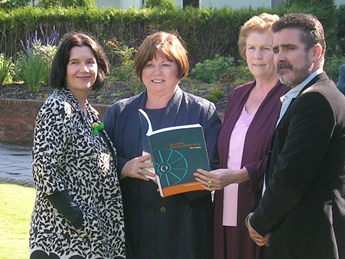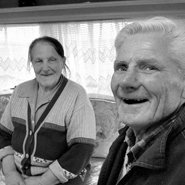Posted 03 September 2010
Shorter life expectancy and higher suicide rates among Travellers, study shows
The Minister for Health & Children, Mary Harney TD officially launched the findings of an All-Ireland Traveller Health Study at an event in Dublin on 02 September 2010.
The Department of Health and Children in conjunction with the Department of Health, Social Services and Public Safety in Northern Ireland commissioned researchers from University College Dublin to conduct the three-year study.
The aim of the study was to examine the health status of Travellers on the island of Ireland, to assess the impact of the health services currently being provided and to identify the factors which influence health status.
“Traveller health continues to be a priority and considerable work has already been undertaken in this area,” said Minister Harney. “This commitment is reflected in the significant resources allocated to the commissioning of this study. The findings will provide a framework for policy development and practice in relation to Traveller health.”
The Minister acknowledged the unprecedented level of engagement by the Traveller Community in the three-year study, both as peer researchers and as participants. She noted that ‘the findings are more robust and more useful to policy makers and service providers as a result.’
One of the key findings is that Travellers of all ages continue to have much higher mortality rates than people in the general population, with Traveller men now living on average 15 years less than men in the general population and Traveller women living on average 11.5 years less than women in the general population.
Deaths from respiratory diseases, cardiovascular diseases and suicides were more markedly increased in Travellers compared to the general population. The suicide rates among Traveller men were identified as 7 times higher than suicide rates among men in the general population.
Among the positive results from the study were evidence of good access to health services and improvements in Traveller women’s health.
According to Professor Cecily Kelleher, Head of the UCD School of Public Health, Physiotherapy and Population Science who lead the study, this is the single largest and most comprehensive study on Traveller health ever conducted in Ireland.
“Using innovative new methods, Travellers themselves, together with frontline service providers, worked with researchers to collect the data,” said Professor Kelleher.
“UCD trained 80 study coordinators from Traveller projects as trainers, who trained 400 Traveller peer researchers from over 50 Traveller organisations and Primary Health Care for Traveller projects around the country. This helped achieve an unprecedented participation rate of 80%.”
The study estimates a total Traveller population of 40,129 (36,224 in the Republic of Ireland and 3,905 in Northern Ireland). It also estimates that the average family size in the Republic of Ireland is 4 and 2.5 in Northern Ireland.

Pictured (l-R) Professor Cecily Kelleher, Minister Mary Harney TD, Ms. Missie Collins, Traveller Primary Health Worker, and Mr. Martin Collins, Pavee Point
The Research Project Team
The UCD project team was chaired by Professor Cecily Kelleher. Professor Kelleher is the Head of the School of Public Health, Physiotherapy and Population Science and former director of the National Health and Lifestyle surveys, SLÁN (Survey of Lifestyles, Attitudes and Nutrition) and the Irish component of the international HBSC (Health Behaviours among School- going Children).
The findings of the Study are presented in four volumes which are available to download from the Department of Health and Children as follows:
Summary of Findings - a background to the Study and summarises the key findings of the three Technical Reports. (This volume is also available in printed format); Technical Report 1 featuring the findings of the Census of Traveller Population and a Quantitative Study of Health Status and Health Utilisation;
Technical Report 2 which reports on Demography and Vital Statistics including mortality and life expectancy data, a preliminary report of the Birth Cohort Study and a report on Travellers in Institutions. The Birth Cohort Study will follow up on babies for 1 year from their birth and data collection is due to end on 13th October 2010. A final report of the Birth Cohort Study will be published once all data is collected and processed.
Technical Report 3 which reports on Consultative Studies including qualitative studies based on focus groups and semi-structured interviews with Travellers and key discussants, and a survey of Health Service Providers.
Key findings of All Ireland Traveller Health Study
The Traveller population in the island of Ireland was estimated at 40,129 in 2008; 36,224 in the Republic of Ireland and 3,905 in Northern Ireland.
Life expectancy at birth for male Travellers has remained at the 1987 level of 61.7 which is 15.1 years less than men in the general population, representing a widening of the gap by 5.2 years. This is equivalent to the life expectancy of the general population in the 1940s. There are, however, marginal increases in male Traveller life expectancies at later ages.
Life expectancy at birth for female Travellers is now 70.1 which is 11.5 years less than women in the general population, and is equivalent to the life expectancy of the general population in the early 1960s. This has improved from 1987 when life expectancy was 65 years. Traveller infant mortality is estimated at 14.1 per 1,000 live births. This is a small decrease from an estimated rate of 18.1 per 1,000 live births in 1987.
Over the same time period the general population infant mortality rate has reduced from 7.4 to 3.9 per 1,000 live births.
Travellers, in particular males, continue to have higher rates of mortality for all causes of death. Male Travellers had a higher Standardised Mortality Ratio (SMR) in 2008 (372) compared with 1987 (351), while in the same period the SMR of males in the general population has reduced from 161 to 100.
The SMR for female Travellers in 2008 reduced to 309 compared with 472 in 1987, while in the same period the SMR of females in the general population has reduced from 150 to 100.
There have been improvements in Traveller women’s health, notably (1) a narrowing the gap in life expectancy between Traveller and non-Traveller women of 0.4 years, (2) reduction in fertility rates to 2.7 per 1,000 population and (3) uptake of cervical screening at rates higher than the general ROI population and uptake of breast screening at rates similar to the general ROI population.
Access to health services is good, with Travellers stating that their access is at least as good as that of the rest of the population.
Access to primary care services is an important element of health services delivery. Over 94% of Travellers in ROI have a Medical Card with this figure rising to 99% in the older age group and nearly 97% of all Travellers in ROI are registered with a GP. The Traveller Primary Health Care workers are part of the HSE Primary Care Team. However, the research reports that the healthcare experience is not as good as the general population, with communication cited as a major issue by both Travellers and service providers.
Just under half of all Travellers feel discriminated against. This is experienced in all aspects of life. However, least discrimination is experienced in sport, followed by the health sector. Travellers have a strong sense of community and high levels of community/family support.
Suicide rates are nearly 7 times higher in Traveller men compared with the general male population.
Education levels are very low with only about half of Traveller adults having completed at least primary school education. However, more than 90% of 14 year olds are now in school or training centres.
Traveller Health Services
Following the results of the study in 1987, a wide range of specific Traveller dedicated health services, such as Traveller Health Units and Primary Health Care Projects, were developed.
The provision of health services for Travellers is a matter of priority for the Department of Health and Children in partnership with the HSE. Since 1997, funding for Traveller specific health services has increased to over €11 million per year. Structures have been put in place to ensure the effective delivery of services. Traveller Health Units operate in each HSE area and the units comprise representatives from HSE management and Traveller representatives. These units work in partnership with local Traveller organisations and the Travelling community.
At central policy level the Traveller Health Advisory Committee, which comprises of representatives of the Department of Health and Children, the HSE, Travellers and Traveller organisations, advises the Minister on policy in relation to Traveller health.
The significant investment in Traveller health has also allowed for the appointment of designated Public Health Nurses for Travellers and the replication of Primary Health Care for Travellers projects which established a model for Traveller participation in the development of health services.
(Produced by UCD University Relations)

